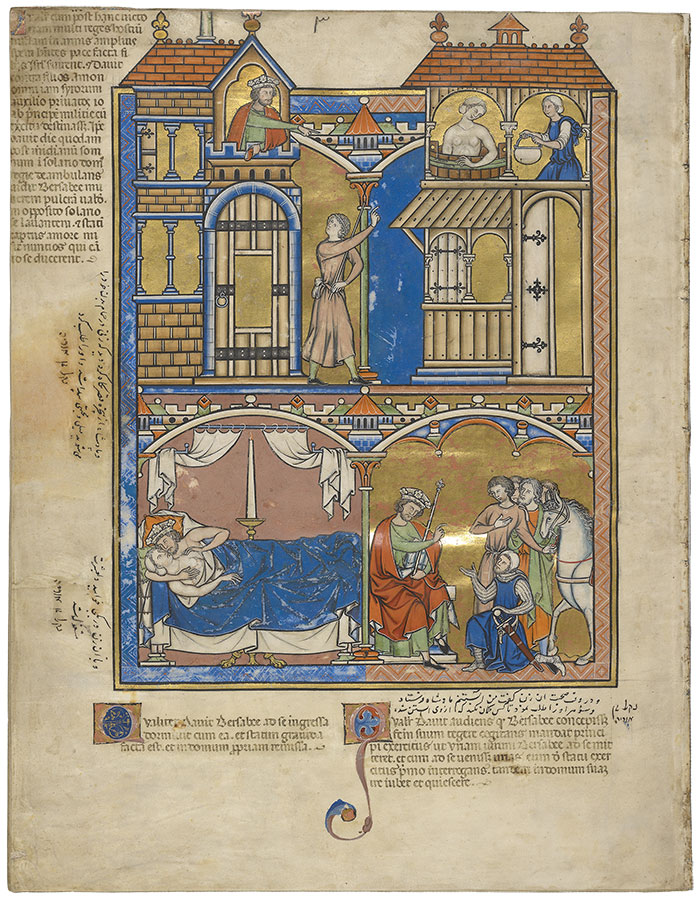
David's Lust, Adutlery, Damage Control
Old Testament Miniatures with Latin, Persian, and Judeo-Persian inscriptions
Purchased by J.P. Morgan (1867–1943) in 1916
David's Lust
The stage is set for David's greatest sin. One evening, from the roof of his palace, the king spies a lovely woman at her bath. Overcome with lust, he sends a messenger to discover her identity and learns that she is Bathsheba, wife of Uriah the Hittite. (2 Kings 11:2–4)
Adutlery
David takes Bathsheba to bed, and she conceives a son by him. (2 Kings 11:4–5)
Damage Control
Joab is summoned and ordered to fetch Uriah from the Israelite camp. David orders the soldier to return home to his wife, reasoning that if Uriah presently lays with Bathsheba, no one can accuse her of infidelity when her child is born. (2 Kings 11:6)
Folio 41v (Latin)
Upper half: How, when after this victory many enemy kings had no hope left in arms, made peace with the children of Israel, and were serving them, and when David had sent the army and Joab, its captain against the children of Ammon, by now deprived of their Syrian auxiliary forces, it happened one day that David was walking, after his midday sleep in a balcony in the palace, when he saw Bathsheba, a beautiful woman indeed, washing herself in a balcony over against him. Thereupon he fell in love with her and sent messengers to bring him. (2 Samuel 11:1–4)
Lower left: How when Bathsheba had come to him, David slept with her and immediately she was impregnated and sent back to her own house. (2 Samuel 11:4–5)
Lower right: How upon hearing that Bathsheba had conceived, David, intending to conceal his deed, ordered the captain of the army to send to him Uriah, Bathsheba’s husband. When Uriah had come to him, he first asked him about the state of the army, and then ordered him to go home and lie down. (2 Samuel 11: 5–8)
Folio 41v (Persian)
Persian foliation: 3
Upper left margin: The king looked out of the window of the castle. He saw that a woman was washing her body in the bathhouse. Desire and love surfaced [in him] and he summoned her.
Lower left margin: And he slept somewhere with that woman and engaged in intercourse.
Lower right: When conversing, the woman said, "I am pregnant."
The king sent for her husband to summon him so that no one would imagine that she had conceived from him.
Folio 41v (Judeo-Persian)
Upper left margin, furthest left: The Tale of Uriah’s wife.
Lower left margin, furthest left: The Tale of Uriah’s wife.
Lower right, furthest right—small blurb: The Tale of Uriah’s wife.
Content consultant: Richard Leson
Persian translated by Sussan Babaie
Judeo-Persian translated by Vera Basch Moreen
Latin translation by Eran Lupu
After the commentary volume accompanying the Fine Art Facsimile edition by Faksimile Verlag Luzern
